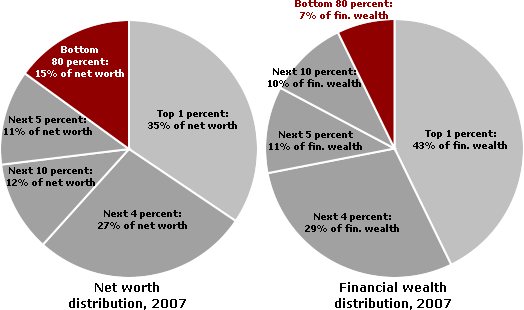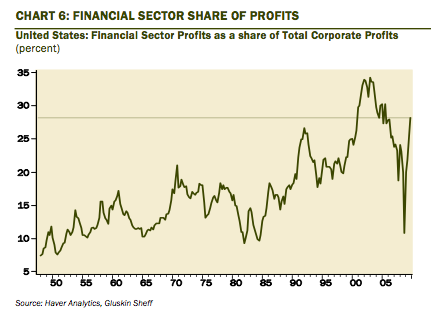Trade and "Trade War" with China: Who Benefits?
By asking cui bono--who benefits from trade with China--we clarify why a "trade war" is unlikely: it would severely crimp U.S. corporate profits.
I have been covering trade with China in depth for over five years. For five years, I have been highlighting the real dynamic in China-U.S. trade: the stupendous profits being skimmed by U.S. corporations as a result of moving manufacturing to China.
I have documented this reality again and again--to list just three examples:
China Trade Surplus: Gusher Profits for U.S. Corporations (August 13, 2005)
Trade War with China: Who Benefits? (April 11, 2007)
U.S. Decline: We have Met the Enemy, and It Isn't China (March 24, 2010)

The key dynamic to understanding trade with China is U.S. corporate profits. In broad brush, what happened was simple: U.S. global corporations had run out of profitable places to invest their capital in their home domestic market of the U.S. The technology boom had been underway since the early 1980s, and much of the low-hanging fruit of improved productivity had already been reaped.
Pretax corporate profits rose to $1.5 trillion in the 4th quarter of 2009--roughly 10% of the nation's GDP.
In the big picture, the U.S. market was "mature"--everybody already had everything, and the only gains to be had were marginal, shaved off at the expense of competitors. So the marketers conjured up a new line of toothpaste and various gimmicks were added to vehicles, but growth in the U.S. was modest, as befits a mature consumer economy.
So how could corporations increase profits? By slashing production costs. If you can't sell 30% more every year, then how do you make 30% more profits? By cutting your production costs by 30%.
How do you do that? By moving production overseas, mostly to China. As I exhaustively document in the three links above, profits for the companies in China which make the goods for Corporate America are slim--from 1% to 3%. The big profits flow not to China-based companies, but to the foreign firms which own the production facilities and sell the goods in advanced economies.
This is the fundamental dynamic of trade with China--it has enabled an explosion in U.S. corporate profits to unprecedented heights. If you think about it, it is absolutely staggering that 10% of the entire U.S. GDP ($13.5 trillion) is corporate profits.
One of the key features of Capitalism is that capital flows to the highest returns. Corporations which fiddled around in the U.S. tweaking a bit more efficiency out of U.S. labor earned marginal returns on the substantial investments required to move the needle in the U.S.
Competitors who shipped production overseas reaped stupendous gains from their investment of capital in China.
The standard line has it that the U.S. consumer gained from this trade because prices for goods which could be imported from China fell. There are a few things wrong with this superficially appealing story.
1. The reduction in costs registered by consumers has been estimated at around $150 billion a year-- roughly 1/10th of toal corporate profits. In other words, consumers' rather modest gains have been far surpassed by the profits reaped by corporations making stuff in China at huge reductions in cost and then lowering the price a bit on the finished retail goods.
This is akin to telling the guy who lost a $30,000 a year job that he should be happy because he saved $300 a year on the crap he bought at Wal-Mart.
2. And it is crap. If the "full lifecycle costs" of the poor quality goods being imported from China were compiled, that "low price" turns out to be much higher than a superficial accounting reveals.
The junk imported from China falls apart so quickly that it must be replaced again and again. Over a decade, three "cheap" items cost far more than one quality item.
3. A substantial slice of these outsized profits result from the avoidance of environmental "scrubbing" and other regulations imposed in the U.S., Japan and Europe. With environmental costs dumped on China, the savings flow directly to global corporate bottom lines.
4. Ditto for labor costs. We all know labor costs are much lower in China and other developing nations, but protections for workers were also modest. So workers could be pushed into unsafe conditions, their wages ripped off, their pensions dismissed, etc., all without fuss--as long as the Party bigshots received a share of the profits.
In other words, exploitation played a big part in reaping these gigantic profits.
These bitter realities don't show up in the footnotes of those glowing, sanitized profit statements or in the rosy accounts spewed by apparatchik economists about the "benefits of global capital flows."
No wonder Americans are increasingly skeptical of the "benefits" of "free trade":Americans Sour on Trade (WSJ.com). Perhaps they have realized that they have reaped few of the benefits.
So who harvested all these enormous U.S. corporate profits? The top 10% who own most of the financial assets of the nation. I reprint this pie chart often, just to remind readers that "ownership America" is concentrated in the top 10%.

Note that the "net worth" chart is pre-housing implosion, so the net worth of the bottom 80%--largely home equity--has plummeted to much less than 15% of total wealth.
In other words, 83% of the vast wealth reaped from trade with China flowed to the top 10% of U.S. households, and most of that flowed to the top 1%. The bottom 90% received the dubious "benefits" of saving a few hundred bucks a year off their low-quality consumer purchases.
This explains why corporate America will not allow a "trade war" of the sort which cuts into their profits. If corporations are reaping hundreds of billions in profits from trade with China--please recall that the China-based manufacturer probably earns $15 or less from manufacturing an iPad while Apple skims $150-- and a congressperson can be "purchased" for a few million in campaign donations, then why would Corporate America allow some parasitic Congress to mess with their profit machine?

The full story of the decline of manufacturing and industry in the U.S. is not complete without looking at the dominance of finance.The U.S. economy has been effectivelyfinancialized, meaning that Financial Elites have come to completely overshadow industry and manufacturing.
The financial share of total profits rose to 28% of all corporate profits.
Economist Michael Hudson has explored this financialization in depth, and tied it into Marx's original conception of how Industrial Capitalism differs from Finance Capitalism.
Financial Warfare against Labor and Industry
From Marx to Goldman Sachs: The Fictions of Fictitious Capital
Financialization of the U.S. economy and the exploitation of trade with China are deeply related. Domestic industrial capitalism ran into the limits of overcapacity and saturated markets; additional capital investments reaped marginal gains in profits.
The "answer" was to financialize the U.S. economy with vast increases in credit, debt and leverage, enabling a hyper-consumerist economy built on a pyramid of debt and leverage. Industrial Capitalism shifted capital and production overseas for a "two-fer"--to skim unprecedented profits from lowering production costs and by expanding into newly opened economies in China, India and elsewhere.
Simply put: Finance took over America, and Industrial Capital moved overseas. Both profited immensely, and China gained an industrial sector paid for by overseas capital and 200 million jobs for its restive, ambitious populace.
But all those virtuous cycles have run their courses, and all the low-hanging fruit has been picked. Now things get tougher for everyone, and the conflicts cannot be resolved easily.
More on these topics tomorrow. Here are some recent entries on China:
Why China's Housing Bubble Is Unsustainable (September 16, 2010)
China's Real Estate: Black-Hole Capital Trap (July 14, 2010)
China's Towers and U.S. McMansions: When Things Fall Apart (Literally) (April 14, 2010)
China and the U.S.: Dysfunctional Real Estate Bubble Twins (January 21, 2010)
The Myth of "Decoupling" and the Chinese Consumer (September 14, 2010)

Life has put on a full-court press, and while I read every email I am unable to respond to all correspondence. Hopefully Life reverts to a half-court press soon. (Please excuse the basketball analogy.)
If you would like to post a comment where others can read it, please go toDailyJava.net, (registering only takes a moment), select Of Two Minds-Charles Smith, and then go to The daily topic. To see other readers recent comments, go to New Posts.

Order Survival+: Structuring Prosperity for Yourself and the Nation and/or Survival+ The Primer from your local bookseller or from amazon.com or in ebook and Kindle formats.A 20% discount is available from the publisher.
Of Two Minds is now available via Kindle: Of Two Minds blog-Kindle
| Thank you, James V. ($5), for your much-appreciated generous contribution to this site-- I am honored by your support and readership. | Thank you, Paul B. ($50), for your outrageously generous second contribution to this site-- I am honored by your continuing support and readership. |



























